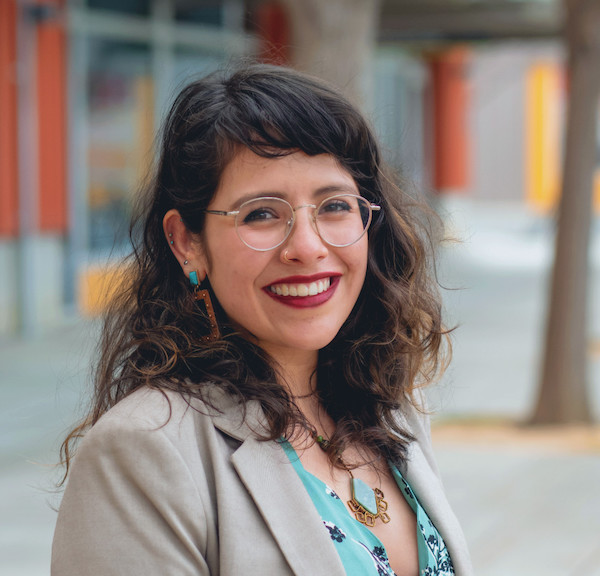How I Discovered My Voice In Advocacy

By Ruth Rosas, Program Supervisor for America Walks

To learn this piece in Spanish, click on right here.
I used to be born in Mexico however grew up in a rural city in Northern Illinois. On this small city, I walked to highschool, even within the winter, and delivered the native newspaper by bike. And within the summers, I performed in entrance yards and backyards with youngsters from my block from morning to nightfall. Though my neighborhood was very walkable, I felt embarrassed strolling locations.
My household stood out. We have been visibly totally different. We converse Spanish, we’ve gentle brown pores and skin and we have been residing in a city that was homogeneously white and English-speaking. I noticed individuals strolling on the weekends, on the principle avenue, and close to parks, however in any other case, most individuals trusted their automobiles. Many homes have been unfold out in between miles of cornfields and there weren’t any public transportation choices, so individuals drove.
In my pueblo in Mexico, we walked in every single place. And I by no means thought of strolling to be embarrassing there. However within the U.S. after I didn’t see a majority of my friends strolling to highschool, grocery retailer, library, or wherever else, I grew to become conscious of different divisions in life apart from language and pores and skin coloration. I grew to become conscious of social class and tradition. My household didn’t have every other choices for transportation, so I continued strolling and using my bike and the embarrassment of being totally different continued.
For school, I moved to Chicago to review structure. Chicago opened up my world to public transit and redlining. As a result of I used to be new to Chicago, I used to be warned by mostly-white individuals to steer clear of sure neighborhoods as a result of they have been harmful. Sooner or later, I needed to go to a neighborhood I used to be warned about and what I discovered have been individuals like me and eating places stuffed with meals I used to be aware of. It was then that I started to discover the deep divisions that bias, racism, and segregation created in Chicago.
My first ‘actual’ job out of college paid so little that I began biking the 12 miles to work to economize on transportation. Quickly, I began biking in every single place. However I seen the best way individuals talked about individuals on bikes, pedestrians, and people on public transit, typically equating the dearth of a automobile with the dearth of wealth. This introduced again these recollections of isolation and embarrassment that I felt strolling to highschool in my small, rural city. Nonetheless, not proudly owning a automobile felt like financial freedom and I leaned into biking and dove into the world of lively transportation. And on the age of twenty-two, I started to be taught the language of transportation advocacy. Now, nearly all of my grownup life has been spent utilizing my voice to advocate for secure streets for marginalized communities. Nevertheless it hasn’t been a straightforward journey.
When I discovered myself sitting at neighborhood tables with advocates and professionals discussing transportation points throughout our communities, their tales didn’t mirror my very own. In truth, tales like mine have been stereotyped, misunderstood, or worst of all, forgotten. I didn’t want an incentive to stroll, bike, or take public transit. I traveled that means out of necessity. It was tough to seek out areas that wished to attract upon a mess of views and think about how the constructed setting affected totally different individuals.
However the lack of engagement and illustration aren’t the principle points. As an alternative, they level to bigger racial and wealth disparities that exist and the dearth of energy that communities are given. As a result of the transportation system dictates who has or doesn’t have accessibility and alternatives to assets, transportation shapes virtually each a part of everybody’s lives. In my work, I’m decided to assist individuals from marginalized communities in transportation areas. Repeatedly I’ve felt silenced in my considerations and my story was made to really feel insignificant.
However with time, I discovered the language and located my voice in transportation advocacy. It has been by lived experiences and by mobility justice leaders like Dr. Adonia Lugo who has written in regards to the function of mobility and racial justice for years, Naomi Doerner who was one of many first individuals I heard talk about fairness in transportation, and numerous others who’ve advocated for individuals who have been invisibilized. Now with Latino Advocacy Week beginning, I’m reminded there’s energy in unity, neighborhood, and catalyzing change by bringing new voices into these areas. You will need to proceed fostering advocacy expertise in communities which have been deliberately or unintentionally disregarded.
I’m joyful to be becoming a member of America Walks, elevating consciousness, organizing for change, and advocating with communities whose voices and energy have been suppressed and minimized. By this work, America Walks will begin to present Spanish language assets to make sure that communities like mine have entry to information and might be included in conversations to advocate for change. I’m extremely smitten by this work and sit up for seeing you on the market in our frequent work for change.
Learn extra about Ruth right here.